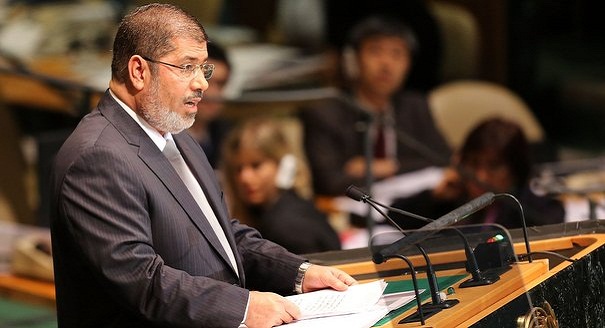Every week leading experts answer a new question from Judy Dempsey on the international challenges shaping Europe's role in the world.
James W. Davisdirector of the Institute of Political Science, University of St. Gallen
Is an end to the Gaza Crisis in Morsi’s interest? I’m not so sure.
If Americans tend to over emphasize the utility of force as an instrument of statecraft, Europeans suffer from the tendency to assume that rational individuals will always prefer peace to violence. If this were the case, we could reduce the historical prevalence of warfare to widespread irrationality or one big misunderstanding. The latter, a favorite of Liberals, is a quaint, but ultimately misguided fallacy.
The fact is that people often resort to violence because they will be better off—or at least less disadvantaged—than if they remain at peace. And bystanders often look on with Schadenfreude because they stand to benefit from the weakening of one or both of the warring parties.
Thus, the first step for developing a European approach to the current crisis is a clear assessment of the interests and goals of Hamas, the Israelis, and other regional actors.
Almut Möllerhead of the Alfred von Oppenheim Center for European Policy Studies at the German Council on Foreign Relations (DGAP)
Europeans can support President Morsi in being a credible and accepted broker. Developing reliable ties with the Egyptians, for example through the first meeting of the EU-Egypt task force last week, the diplomatic efforts of Catherine Ashton and her team at the European External Action Service, or individual, yet coordinated, initiatives of EU member states, are crucial. Europe can demonstrate its willingness to learn about and show respect for Egypt’s new foreign policy ambitions. Europeans should openly support Egypt in its negotiation efforts, as declared by Catherine Ashton following yesterday’s EU Foreign Affairs Council. A solid working relationship with the Egyptian leadership will enable the EU to better raise sensitive questions, for example regarding the Muslim Brotherhood’s relationship with Hamas and Islamic Jihad. A solution that is not respected by all factions as legitimate has no chance to endure. Through a strong engagement with Egypt, while continuing to engage with Israel, the EU can bring in its weight as an accepted facilitator, which has been built through many years of trying to help negotiate peace between Israel and the Palestinians.
Nathalie Toccideputy director of Istituto Affari Internazionali
Egyptian President Morsi is emerging as the unrivalled mediator in the Gaza crisis. Despite troubled relations with Israel and far from trouble-free ties to Hamas, Morsi is occupying center-stage in Gaza, striving to prevent the week-long Israeli aerial bombing campaign from escalating into a full-scale ground invasion, which would have devastating implications for civilians. Egypt’s efforts remind us—once again—of the bankruptcy of the official international mediation forum for the Arab-Israeli conflict: the Middle East Quartet. At least since its 2006 boycott of Hamas, the Quartet, and the EU within it, has de facto ruled itself out of meaningful mediation in the region.
This begs the question of how the EU can play a meaningful role this time by supporting the Egyptian mediation process? Precisely because of its no contact policy with Hamas, its channels to, and leverage on, Gaza are highly circumscribed. Here the EU—and indeed the United States—can only engage those actors—Egyptians, Qataris, and Turks amongst others—that have developed ties with, and influence on, Hamas. Far more pertinently though, the EU can and should make it clear that it does not consider an on-going Israeli attack on Gaza, particularly through a ground invasion, as a legitimate and proportional act of self-defense, and that bilateral EU-Israel relations will suffer as a consequence. The EU’s levers on Israel have grown progressively as the bilateral relationship has developed over time—and irrespective of the evolution of the conflict. The question is whether, and when, the EU will muster the political will to use these.






.jpg)